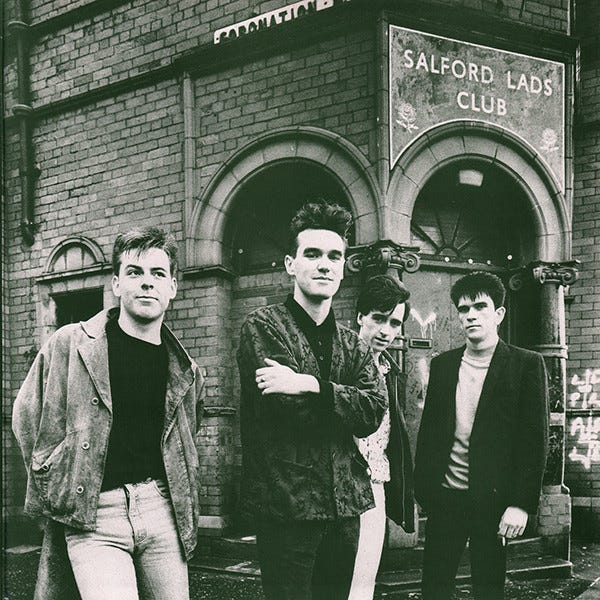Born in Manchester on June 1, 1963, Michael 'Mike' Adrian Paul Joyce is the only son of Irish Catholic parents. Joyce attended St Gregory's Grammar School in the city. He married Christina 'Tina' Riley in 1994, with whom he has three children. Joyce is a Manchester City fan, and is sometimes interviewed at City Square before important home matches. Since October 2017, he has hosted a weekly radio show on Manchester radio station XS Manchester.
In 1982 Morrissey and Johnny Marr had already formed the core of the band that would be known as the Smiths. Needing to complete the lineup, they placed an advert in a local Manchester music magazine called Musician's Weekly, seeking a drummer. Mike Joyce responded and auditioned—impressing Marr with his energy and skill despite coming from a punk background. He was officially brought into the group shortly after, completing the classic Smiths lineup along with bassist Andy Rourke
.
Joyce contributed significantly to the band's sound with his solid, understated, yet dynamic drumming. While not as attention-grabbing as Morrissey's vocals or Johnny Marr's guitar work, Joyce's playing provided a crucial rhythmic backbone that allowed the others to shine.
His style blended punk energy with a more refined, melodic sensitivity, helping to shape songs like "There Is a Light That Never Goes Out" and "The Queen Is Dead." Joyce's tight timing and ability to follow Marr’s often intricate guitar arrangements gave the band a rhythmic stability that grounded their otherwise unconventional sound.
After the Smiths disbanded in 1987, Joyce went on to play with other artists, including Morrissey (briefly) in 1988 when he provided the drums on two of the latter's solo tracks in 1988 ('Interesting Drug' and 'The Last of the Famous International Playboys'1, each released as singles in 1989).
Joyce took legal action against both Morrissey and Marr in early 1989 over his share of Smiths' royalties—a case he ultimately won. It is notable that Joyce only initiated legal action against his former bandmates only after it became apparent to him that his post-Smiths collaboration with Morrissey was not going to be renewed.
In 2001 Joyce was awarded over £1 million in back royalties and 25% of future earnings from the band's activities (excluding songwriting and publishing). Unfortunately for him, this may have been a Pyrrhic Victory. While Joyce had indicated his interest in a reunion of the Smiths several times over the decades since the band's demise, his legal action against Morrissey, and most especially his efforts to collect upon his monetary awards (at one point he took action against the home of Morrissey's mother2), rendered such an event completely out of the question. In Autobiography, Morrissey referred to Joyce as a "flea looking for a dog" and "Joyce Iscariot," suggesting a betrayal akin to Judas Iscariot's infamous act.
Joyce cannot be faulted for seeking to improve his situation, especially if a post-Smiths collaboration with one or more of his former bandmates would have proven lucrative (as with the rest of us, life goes on and bills and mortgages have to be paid), but there is more than one way to go about this. While many argue - and not without justification - that the contributions of Joyce and Rourke were invaluable to the success of the Smiths, each member of the band had a defined role that came with set remuneration that was not subject to any attempts to re-negotiate until after it became apparent that the Smiths cash cow was dead. Indeed, Money does change everything.
Joyce, Andy Rourke, and "Fifth Smith' Craig Gannon all appear in the promotional music video for 'The Last of the Famous International Playboys'.
When Morrissey failed to make the required payments to Joyce, the latter took steps to enforce the judgment. This included placing a lien on Morrissey's mother's house in Manchester, effectively rendering it unsellable until the debt was settled. Morrissey later described this action as an attempt to "persecute" his mother, stating that bailiffs had frightened her into believing she might lose her home. The situation escalated to the point where Morrissey sought legal recourse in the European Court of Human Rights, arguing that the enforcement actions violated his rights. However, Joyce eventually dropped all claims, including those against Morrissey's mother and sister, just before the case was set to proceed .







According to Joe Moss's accounts, all Morrissey's earnings were paid to his Mother. We have Joe's copies of the contracts and everything relating to his role, including the later disputes and legal actions. If The Smiths were to be seen as a 'cash cow' then there's a lot of people milking that cow these days. The individual band members are all subject to the music industry, which is a bit like a dairy farm, without their milk there is nothing to bottle.